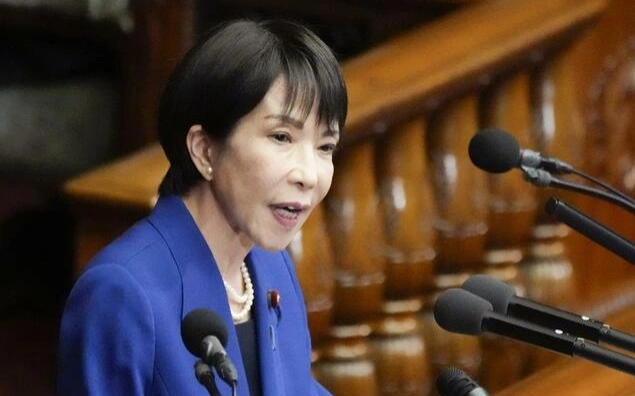Japan PM Takaichi stresses aggressive fiscal policy, higher defense costs
New Prime Minister Sanae Takaichi said Friday she will pursue aggressive fiscal spending to revitalize Japan's economy and higher defense outlays to address growing security challenges, Kyodo reports.

In her first speech in parliament since being elected as Japan's leader on Tuesday, succeeding Shigeru Ishiba, Takaichi underscored her government's determination to tackle rising living costs as a "top priority."
Takaichi, widely seen as a fiscal dove and security hawk with conservative values, pledged to raise Japan's defense budget to 2 percent of gross domestic product by March, two years earlier than the current target of fiscal 2027.
The 64-year-old leader of the Liberal Democratic Party, Japan's first female prime minister, made no reference to the empowerment of women in her speech.
"I will turn (people's) anxieties about the present and future into hope and build a strong economy," she said at an extraordinary parliamentary session, highlighting her commitment to "responsible and proactive fiscal policies" to "raise incomes, improve consumer sentiment, enhance business profits and boost tax revenue."
Her expansionary fiscal policy could boost the issuance of deficit-covering government bonds, but Takaichi said financial sustainability would be achievable if the ratio of government debt to GDP declines by ensuring the increase in outstanding debt is slower than economic growth.
In an effort to fight inflation, Takaichi said she aims to abolish the provisional gasoline tax rate, which has been in place since 1974, during the ongoing Diet session through Dec. 17, and lift the nontaxable income threshold from the current 1.03 million yen ($6,700) to 1.60 million yen this year.
The government will begin designing a system to introduce a mix of income tax deductions and cash benefits for households, while ditching an unpopular plan to provide 20,000 yen per person, she added.
The 20,000 yen cash handout plan was an LDP pledge in the House of Councillors election in July, which led to the loss of the ruling coalition's upper house majority and prompted Ishiba's resignation.
To find ways to strike a balance between the costs and benefits of the country's social security system amid its graying population and declining birthrate, the prime minister said she will set up a framework for cross-party discussions involving experts.
On the security front, Takaichi expressed her readiness to revise the long-term National Security Strategy, which sets a spending target of 2 percent of GDP, and two other key documents by the end of next year.
"We need to proactively promote the fundamental strengthening of our nation's defense capabilities" to deal with "various changes in the security environment" since the three policy papers were drawn up in late 2022, Takaichi said.
Calling the alliance with the United States the "cornerstone" of Japan's diplomatic and security policies, Takaichi said her government will deepen multilateral dialogue with countries such as South Korea, the Philippines, Australia and India, and advance a "free and open Indo-Pacific", where China is increasing its military activities.
Takaichi emphasized that China is an "important neighbor" with which Japan needs to foster "constructive and stable" ties and promote a "strategic and mutually beneficial" relationship.
Amid media reports that some tourists and foreign residents are not complying with rules, Takaichi vowed to "firmly" handle the matter, while promising the government will "keep a distance from xenophobia."
Takaichi called on other political groups to collaborate with her minority government to "stabilize politics," after the LDP's longtime partner, the Komeito party, quit the ruling coalition earlier this month and was replaced by the center-right Japan Innovation Party.
"Without political stability, we cannot pursue strong economic measures, nor diplomatic and security policies," Takaichi said.
She also said her government would "flexibly and sincerely" accept policy proposals from opposition parties and discuss them providing that they do not conflict with the LDP's basic stances.
As written before, LDP's Takaichi elected Japan's PM in lower house of parliament.
